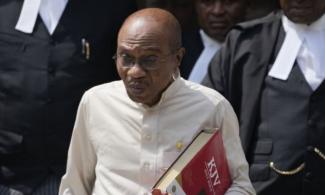
Ayoh, who is the second prosecution witness in a trial before Justice Rahman Oshodi of Lagos High Court Sitting in Ikeja insisted that Emefiele turned collection of bribes to a normal way of the apex bank procurement process.
A former Director of Information Technology of the Central Bank of Nigeria, John Ayoh, has accused former governor of the apex bank, Godwin Emefiele of always collecting bribes before he awarded any contracts during his tenure.
Ayoh, who is the second prosecution witness in a trial before Justice Rahman Oshodi of Lagos High Court Sitting in Ikeja insisted that Emefiele turned collection of bribes to a normal way of the apex bank procurement process.
Ayoh said, “That is how he operates, he will not award contracts without collecting anything”.
While being led in evidence by Counsel to the Economic and Financial Crimes Commission (EFCC), Rotimi Oyedepo, Senior Advocate of Nigeria, the witness described how he collected funds on behalf of the former CBN Governor.
He stated that the first money he collected was $400,000 from Emefiele's aide, John Adetola, who came to his house in Lekki to collect it for him.
Ayoh also informed the court that the second money he received for Emefiele was $200,000, which was brought by one of the CBN contractors to the bank's headquarters at its Tinubu Lagos Island office.
He stated that the money was in an envelope, and when the person who came to deliver the funds, Victor, arrived at the Bank, he (Ayoh) phoned the governor (Emefiele), who instructed him to collect the money from the vendor because he did not want to see any third party.
Ayoh said when he went into the office to deliver the package after collecting it, he saw several Bank CEOs including the late Hebert Wigwe, who were waiting outside the office of the governor to see him.
While answering questions under cross-examination from Senior Advocate of Nigeria, Olalekan Ojo, who represented the former CBN Governor, the witness denied that he had ever been a party to any crime, but admitted that he had facilitated the commission of a crime unknowingly. He said, “I believe I did admit in my statement that I was forced to commit the crime
“I don’t know the exact word I used in my statement, but I said we were all forced with tremendous pressure to bend the rules.”
The witness also admitted that he did not write in his statement to the EFCC, that the monies were given to influence the award of contracts but added “that this is how he (Emefiele) operates. He will not award contracts without collecting anything”.
Before the witness testified, the former CBN governor had challenged the jurisdiction of the court to try him.
Emefiele contended that he cannot be tried in the high court of any state in Nigeria for alleged abuse of his authority since this presents constitutional and legal difficulties.
The former CBN Governor further stated that counts 1-4 of the 26 charges issued by the EFCC against him are unconstitutional because they are not part of any Nigerian legislation. His counsel requested that the court issue an ORDER to dismiss the accusation against him.
In his application brought pursuant to Sections 36(12), 251 AND 270 OF THE CONSTITUTION OF THE FEDERAL REPUBLIC OF NIGERIA AS AMENDED and Sections 11, 58 AND 60 OF THE ADMINISTRATION OF CRIMINAL JUSTICE LAW OF LAGOS STATE, Emefiele had also submitted that the CBN is an agency of the Federal Government of Nigeria and the Federal High Court has the jurisdiction to the exclusion of other Courts in matters concerning alleged abuse of office by a public officer in a Federal Government agency.
He also stated that none of the elements of the offences he is alleged to have committed occurred or took place in Lagos State having regard to the materials in the Proof of Evidence.
Citing Sections 374 of the Administration of Criminal Justice Act, and Section 396 (2) of the Administration of Criminal Justice Law as well as decided authorities from the appellate courts to buttress his points, Ojo urged the judge to resolve the objection on whether the court has the jurisdiction to try the case.
On his part, the second defendant’s counsel, Senior Advocate of Nigeria, Kazeem Gbadamosi, relied on the submissions of Ojo.
In his response, counsel to the EFCC, Oyedepo objected to the submissions of Emefiele’s counsel.
Citing decided cases of the Supreme Court, he asked trial judge, Justice Rahman Oshodi, not to defer or prevent the trial of the case on the basis of objections challenging the particulars of the counts of the information.
He said, “That approach is intended to take us back to where we are coming from as these were the basis for Section 1 of the Administration of Criminal Justice Act, ACJA and the purpose for which Administration of Criminal Justice Law, ACJL was intended. The intention of our collective resolution as a nation was to prevent undue delay in our criminal cases.
“I urge my lord to refuse this invitation, trial has commenced, this application to prevent the trial today is unlawful, illegal and unconstitutional and I urge the court not to depart from the decision of the apex court as to do so would amount to judicial rascality.
In his ruling, Justice Oshodi, elected to defer his decision on jurisdiction till the end of trial and when he delivers judgment.
The judge also directed EFCC to serve the defence team with the extra judicial statements of witness no 6, one John Ogah and that of another investigation officer.
The court also ruled that the totality of the EFCC’s case against Emefiele would be heard in open court, following the withdrawal of an application by the prosecution requesting a closed-session for some of its witnesses, owing to safety concerns.
Further proceedings in the matter have been adjourned till May 3, 2024, when the court would continue with the trial.